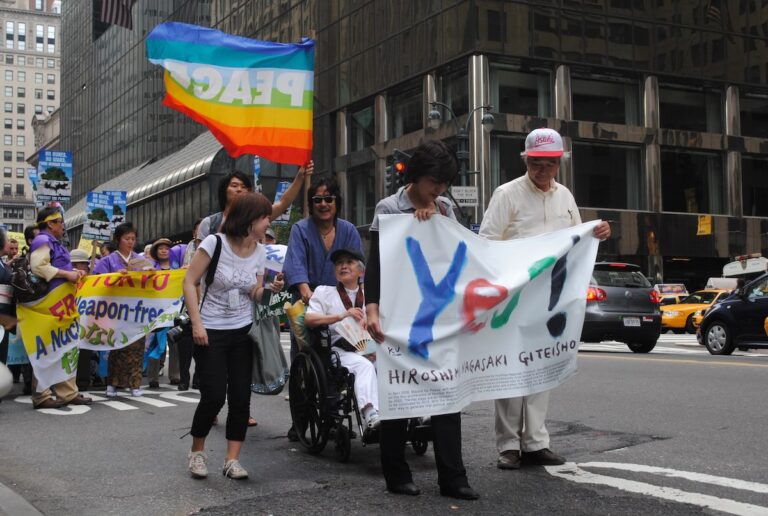Distinguished peace activist and Hiroshima A-bombing survivor, Hideko Tamura Snider, also honored
This week, the distinguished Nobel Committee awarded their Peace Prize to Nihon Hidankyo, a grassroots movement of atomic bombing survivors, people known as Hibakusha in Japanese. The motivation for the award surrounded their efforts to “achieve a world free of nuclear weapons and for demonstrating through witness testimony that nuclear weapons must never be used again.”
If that mission sounds familiar to residents of Southern Oregon, it may be because Hideko Tamura Snider, a local resident, survivor of the Hiroshima bombing, and founder of One Sunny Day Initiatives, has been working towards the same goal through public testimony and initiatives for decades. Her courageous work reminds people about the horrors of nuclear bombing through sharing her personal experience and in her work with Mayors for Peace, that now works in more than 8,000 cities worldwide.
The Chairman of the Nobel Committee, Jorge Frydnes opened the ceremony with a speech about the compelling work of Nihon Hidankyo, echoing a message that we, in our local community, offer to honor Hideko Tamara Snider:
“You did not resign yourselves to victimhood. You defined yourselves as survivors. You refused to sit in silent terror as the great powers led us through long periods of nuclear armament. You stood tall and shared your unique personal testimony with the entire world.
A light in the darkest night. A path forward. You give us hope.
Decade after decade, your stories, your educational work and your urgent warnings against the proliferation and use of nuclear arms have helped to promote and consolidate widespread opposition to these weapons around the world.
You help us to describe the indescribable, to think the unthinkable, and to somehow grasp the incomprehensible pain and suffering caused by nuclear weapons. You have never given up. You are a symbol of resilience. You are the light the world needs.”
Frydnes continued, explaining that he, at 40 years old, had never had direct experience with war, but by listening to stories from survivors — and a shared conviction to prevent the use of nuclear weapons in the future – inform his generation.
“The way we remember violent or traumatic historical events – both individually and collectively – determines whether and how we move forward as a society or remain trapped in the past. Not just individuals but entire societies, current and future, are shaped by trauma,” he said. “It is our duty not to forget. It is our responsibility to pass along stories and memories to future generations – including the painful, disturbing ones, which often yield to society’s amnesia.”
The Nobel Committee offered a lengthy explanation for their decision to award this Peace Prize, including creating the widespread condemnation of nuclear weapons.
“The members have worked tirelessly to raise awareness about the catastrophic humanitarian consequences of using nuclear weapons. Gradually, a powerful international norm developed, stigmatizing the use of nuclear weapons as morally unacceptable. This norm has become known as “the nuclear taboo.”
Despite global condemnation for the use and development of nuclear weapons, we are far from a world without them. As the Chairman said, in a call to global actors, the need for action is as critical now as it has ever been.
“Disarmament also requires courageous and visionary political leaders. None of the nine countries that possess nuclear weapons – the United States, Russia, China, France, the United Kingdom, India, Pakistan, Israel and North Korea – appear interested in nuclear disarmament and arms control at present. On the contrary, they are modernizing and building up their nuclear arsenals,” he said.
“The Norwegian Nobel Committee calls upon the five nuclear-weapon states that have signed the Non-Proliferation Treaty to take seriously their obligations under this treaty. In addition, more countries must ratify the Treaty on the Prohibition of Nuclear Weapons. Political action is crucial.”
Each year on August 6, Peace House hosts a Remembrance Vigil for the victims and survivors of the US atomic bombing of Hiroshima and Nagasaki. During the event, residents and the City itself reaffirm a commitment to doing everything in their power to prevent future use of the weapons.
Peace House, founded in 1982, was inspired by the Nuclear Freeze movement that began in that era to call for an end to the production of nuclear weapons, and organized to create the statutes that make Ashland a nuclear free zone and a member of International Mayors for Peace.
The final words of the Nobel Committee Chairman Jorge Frydnes during the ceremony acknowledged the uphill battle for nuclear disarmament but the need for steadfast work to continue the effort.
“The path towards a world free of nuclear weapons remains long. We will see progress and setbacks. But that does not mean the vision cannot eventually become reality. Imagine a world in which 100 years have passed since nuclear weapons were used on the battlefield,” he said. “Surely this is a vision we can all share. We could listen to those who claim it is pointless, or instead, take inspiration from the Hibakusha – from their stamina and persistence.”


